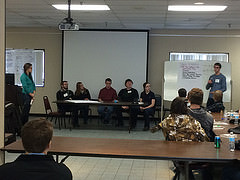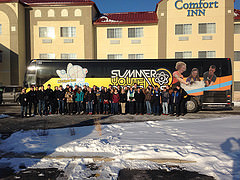In 2008 Under Armour, producer of athletic apparel and gear, produced 730 million dollars in sales worldwide. In a market dominated by the Nike, many viewed them as a ‘bargain brand’ with little meaning behind their trademark. In Jeff Beers’ article in the recent addition of Fast Company he describes how the journeys of elite that athletes helped develop an impactful marketing campaign, providing lessons that could aid in the academic and career success of our youth.
Misty Copeland, the first African American female principal dancer with the prestigious American Ballet Theatre, stated “Success is not easy and I think everyone should know that hard work and perseverance and being open to give back are so much more powerful than stepping all over people to get to the top.” Misty, Stephen Curry, and Jordan Speith are noted for their successes in ballet, NBA basketball, and PGA golf are part of Under Armour’s marketing effort. Each of these athletes have one thing in common, they have reached the pinnacle of their success due to daily dedication to their sport.
Our younger generations, millennials and Generation Z, are used to getting what they want immediately. They are fluent in the use of smart phones and communicate using Twitter and Pinterest, all which provide instant information and gratification. Under Armour’s new campaign, “Rule Yourself”, uses the messages of these athletes that doesn’t focus on the trophy earned, but the work ethic and tenacity that it took to prepare to earn those victories. Nike’s motto is Just Do It, focusing on the motivation it takes to begin the effort. Under Armour’s athlete driven message focuses on the journey which involves daily training regiments, overcoming injuries and competitive disappointments, and thoroughly preparing for success.
Stephen Curry reinforces this message when he states “If you take time to realize what your dream is and what you really want in life – no matter what it is, whether it is sports or in other fields – you have to realize that there is always work to do, and you want to the hardest working person in whatever you do, and you put yourself in a position to be successful. And you have to have a passion about what you do.”
Today’s college students change majors 3 times on average before graduating. McCrindle & Wilson suggest that those in the Generation Y will have five careers in their lifetime. Today it is estimated that an adult will spend 4.4 years at a company before moving on to another more interesting or better paying position. This suggests individuals will always be consistently looking for new challenges and ways to apply their talents.
The key to educating our youth is to help them discover their interests and aptitudes early in life. Discovering their passion will set the course of their academic and career journeys and help propel them forward. The “Rule Yourself” marketing message is resonating with youth, illustrated by Under Armour sales climbing to $4 billion in the current year, expected to pass $10 billion by 2020. Success does not always come to the most talented, but more often to the ones with the passion to work to achieve it.

